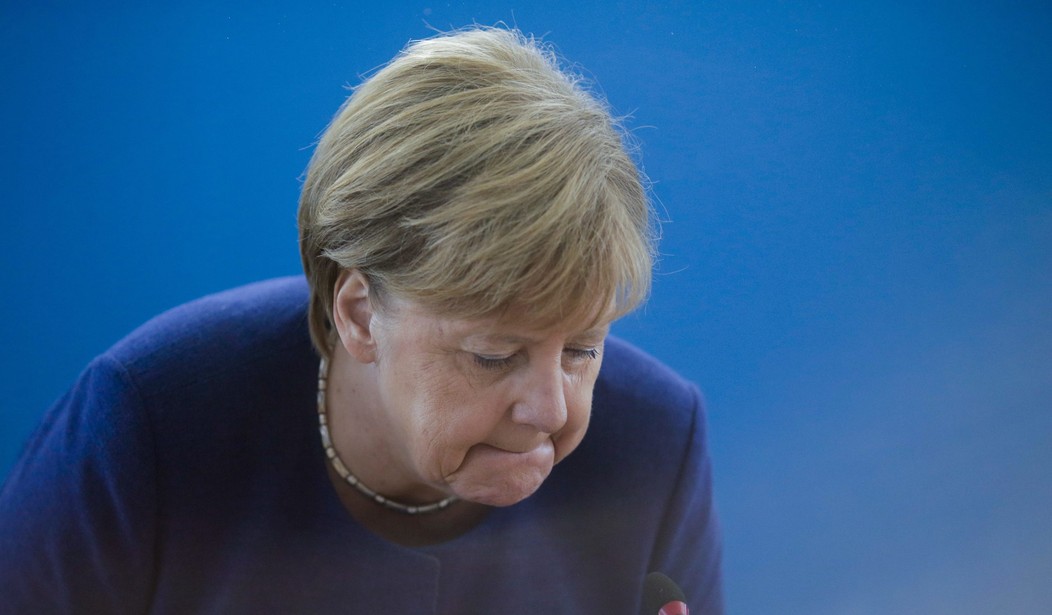In the aftermath of World War II, with Germany decisively defeated and — more important — having acknowledged the fact through its unconditional surrender to the Allies and the execution of many of its leaders, the militaristic spirit of a people who had even terrified the Romans was quenched. The Germans in the west put their energies into the Wirtschaftswunder, the “economic miracle” that allowed them to rebuild their half of the demolished country, while those in the east did their best to both implement (impossible) and survive Communism. Since the fall of the Berlin Wall in 1989, the reunited country has emerged as the economic powerhouse of Europe and the big dog of the European Union.
But now it appears that the essentially unbroken string of center-right/center-left postwar governments is coming apart. Frau Merkel’s beating at the polls yesterday signifies the end of the political consensus and the opening of a Left-Right rift that likely will only worsen over the coming months. Please make allowances for the blatantly biased tone of this Reuters report:
German Chancellor Angela Merkel vowed on Monday to restore trust in her government after her conservative allies suffered heavy losses in a regional election, which their far-right foes hailed as “an earthquake” that would rock the ruling coalition.
The Christian Social Union (CSU), the sister party of Merkel’s own Christian Democrats (CDU), slumped to its worst result in almost 70 years in Sunday’s election in Bavaria. The chancellor’s other coalition partner, the centre-left Social Democrats (SPD), saw its support halved.
In other words, Merkel’s unwieldly coalition between CDU/CSU and the SPD — the two main German political parties — is crumbling, with support now flocking to the extremes: to the AfD (an anti-immigration party) and the Greens.
CSU leader Horst Seehofer, who is also interior minister in Merkel’s loveless coalition, had hoped his anti-immigration rhetoric and criticism of Merkel’s liberal asylum policies would help his party fend off a threat from the far-right in Bavaria. His strategy backfired as the CSU, which has ruled Bavaria for almost six decades, bled votes to the far-right Alternative for Germany (AfD) party and the ecologist Greens in equal measure. On Monday, he appeared to extend an olive branch.
Gotta love that “ecologist” description of what is basically a small-c communist party. Whereas “far-right” is now the all-purpose description both on the Continent and here in America, of anyone opposed to the Leftist project, or any accommodation with it.
“We will do our bit to ensure that the coalition can continue to do its work in a stable manner despite some of the comments that were made yesterday,” Seehofer told reporters. He was referring to angry CSU delegates who blamed their party’s dismal showing on Merkel’s decision in 2015 to welcome some one million, mainly Muslim, asylum seekers, which has fuelled the rise of the AfD.
That ‘s not going to happen. Merkel has hit the end of the rope: her catastrophic “immigration” blunder traduced German tradition, destabilized the social compact (very big in Germany), and has even cost many Germans their lives. And for what? The chancellor is, as usual, clueless:
Merkel said the CSU had lost its absolute majority in the Bavarian parliament even though the regional economy was doing well. “This shows that even a good economic situation and almost full employment are not sufficient if trust is lacking,” Merkel said.
And that’s precisely the point: booming economies are great, but if the nation-state is threatened with cultural destruction, it won’t matter how much Geld folks have in their pockets if their country is mutating and disintegrating before their eyes.
The AfD gleefully seized on the election outcome as a sign of a broader malaise for Merkel’s coalition, which has been shaken by disputes, including over immigration, since it took power seven months ago. “We are very pleased because the goal for the Bavaria state election was to send an earthquake towards Berlin,” Martin Sichert, AfD leader in Bavaria, told a news conference. “This earthquake happened …. We are now excited to see what the consequences will be here in Berlin.”
Merkelism — pretending to be “conservative” while moving steadily to the left — has now been exposed for the fraud it always was. The German voters have spoken — will the politicians in Berlin heed the warning? A factionalized Germany is an unstable Germany, but if past is prologue, probably not.









Join the conversation as a VIP Member